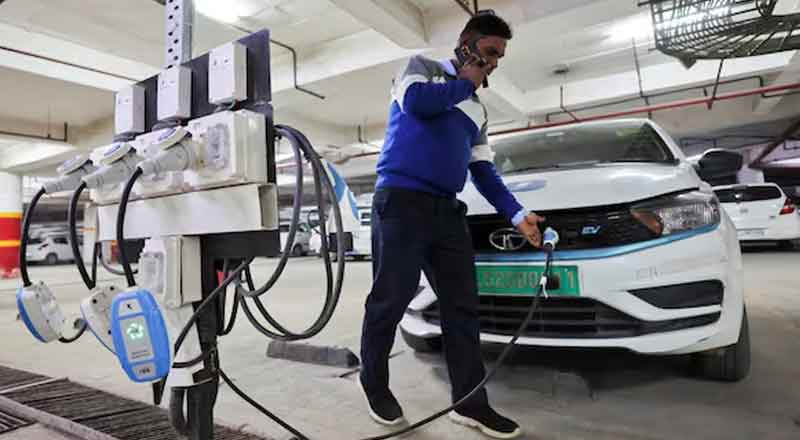- Bengaluru is spearheading the nation’s transition towards electric mobility, surpassing major metropolitan centers like New Delhi and Mumbai in electric vehicle (EV) registrations.
- In the year 2023, Bengaluru witnessed a remarkable surge in electric car registrations, with figures exceeding 8,690 units, marking a significant threefold increase from previous years.
- Karnataka has witnessed an exponential five-fold increase in EV registrations between 2018 and 2021, firmly establishing itself as one of India’s foremost advocates for sustainable mobility.
- A collaborative initiative between the UK Government, NITI Aayog, and the Government of Karnataka has delineated a comprehensive roadmap aimed at transforming Bengaluru into a global EV lighthouse city.
- While Uttar Pradesh leads the nation in total EV registrations, Karnataka boasts the highest number of publicly available charging stations, surpassing the 5,500 mark as of February 2024.
Bengaluru, often referred to as India’s Silicon Valley, is spearheading the nation’s transition towards electric mobility, surpassing major metropolitan centers like New Delhi and Mumbai in electric vehicle (EV) registrations. This paradigm shift is propelled by a confluence of factors, including a tech-savvy populace, supportive government policies, and a burgeoning charging infrastructure network, positioning Bengaluru as a trailblazer in the realm of sustainable transportation.
In the year 2023, Bengaluru witnessed a remarkable surge in electric car registrations, with figures exceeding 8,690 units, marking a significant threefold increase from previous years. This surge is indicative of Bengaluru’s propensity for embracing cutting-edge technologies, as evidenced by its burgeoning community of electric vehicle enthusiasts. Moreover, this enthusiasm extends beyond four-wheelers to encompass a burgeoning market for electric two-wheelers, further reinforcing Bengaluru’s status as a frontrunner in the EV revolution.
Underpinning Bengaluru’s ascent as an EV epicenter is Karnataka’s proactive approach towards fostering an environment conducive to EV adoption. The state has witnessed an exponential five-fold increase in EV registrations between 2018 and 2021, firmly establishing itself as one of India’s foremost advocates for sustainable mobility.
A collaborative initiative between the UK Government, NITI Aayog, and the Government of Karnataka has delineated a comprehensive roadmap aimed at transforming Bengaluru into a global EV lighthouse city. This concerted effort has catapulted Karnataka to the forefront of India’s EV landscape, with the state boasting a cumulative total of 3.4 lakh electric vehicles, encompassing two-wheelers, three-wheelers, and cars alike.
While Uttar Pradesh leads the nation in total EV registrations, Karnataka boasts the highest number of publicly available charging stations, surpassing the 5,500 mark as of February 2024. This robust charging infrastructure underscores Karnataka’s unwavering commitment to facilitating seamless EV adoption, thereby mitigating range anxiety and bolstering consumer confidence in electric mobility.
Looking towards the future, Bengaluru is poised to witness a surge in electric two-wheelers and three-wheelers, with sales penetration projected to reach 30% for private cars and 70% for commercial vehicles by the year 2030. The state’s conducive EV policies, coupled with its thriving tech industry and logistical infrastructure, are pivotal in propelling Bengaluru towards its vision of becoming a global EV hub.
However, challenges persist, particularly in the widespread adoption of electric two-wheelers, three-wheelers, and public taxis. Nonetheless, the state government remains resolute in its commitment to promoting EV use, with plans underway to integrate electric buses into its public transport fleet, thereby further incentivizing the transition towards sustainable mobility solutions.
Karnataka’s robust EV policy framework has garnered significant investments, bolstering the state’s ambition of emerging as a key player in the global EV manufacturing sector. Moreover, the increasing energy consumption by EVs aligns with India’s broader renewable energy goals, further underscoring the significance of Karnataka’s role in the nation’s sustainable development agenda.
As India charts its trajectory towards becoming a global EV manufacturing hub, Bengaluru stands poised to play a pivotal role in steering this transformative journey. With its innovative spirit, robust infrastructure, and unwavering commitment to sustainability, Bengaluru epitomizes the promise of India’s electric future, setting a precedent for cities nationwide to follow suit in embracing the transition towards greener, more sustainable transportation alternatives.
(With inputs from agencies)





